Speaking and Vocabulary Listening Pronuciation Everyday English Function
- 格式:ppt
- 大小:823.50 KB
- 文档页数:19
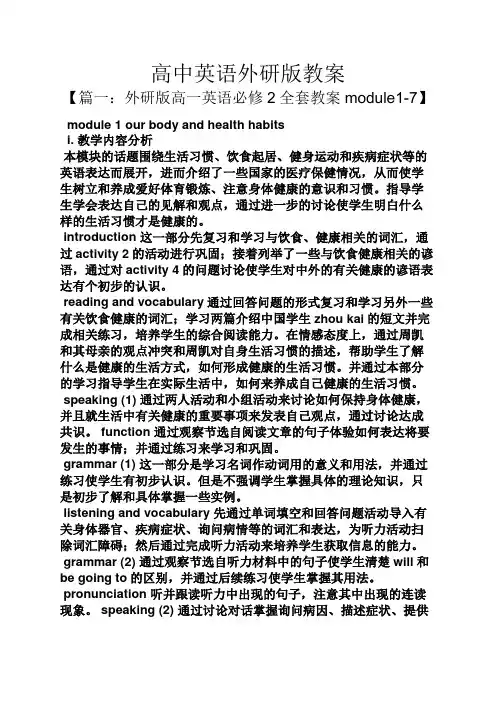
高中英语外研版教案【篇一:外研版高一英语必修2全套教案module1-7】 module 1 our body and health habitsi. 教学内容分析本模块的话题围绕生活习惯、饮食起居、健身运动和疾病症状等的英语表达而展开,进而介绍了一些国家的医疗保健情况,从而使学生树立和养成爱好体育锻炼、注意身体健康的意识和习惯。
指导学生学会表达自己的见解和观点,通过进一步的讨论使学生明白什么样的生活习惯才是健康的。
introduction 这一部分先复习和学习与饮食、健康相关的词汇,通过activity 2的活动进行巩固;接着列举了一些与饮食健康相关的谚语,通过对activity 4的问题讨论使学生对中外的有关健康的谚语表达有个初步的认识。
reading and vocabulary 通过回答问题的形式复习和学习另外一些有关饮食健康的词汇;学习两篇介绍中国学生zhou kai的短文并完成相关练习,培养学生的综合阅读能力。
在情感态度上,通过周凯和其母亲的观点冲突和周凯对自身生活习惯的描述,帮助学生了解什么是健康的生活方式,如何形成健康的生活习惯。
并通过本部分的学习指导学生在实际生活中,如何来养成自己健康的生活习惯。
speaking (1) 通过两人活动和小组活动来讨论如何保持身体健康,并且就生活中有关健康的重要事项来发表自己观点,通过讨论达成共识。
function 通过观察节选自阅读文章的句子体验如何表达将要发生的事情;并通过练习来学习和巩固。
grammar (1) 这一部分是学习名词作动词用的意义和用法,并通过练习使学生有初步认识。
但是不强调学生掌握具体的理论知识,只是初步了解和具体掌握一些实例。
listening and vocabulary 先通过单词填空和回答问题活动导入有关身体器官、疾病症状、询问病情等的词汇和表达,为听力活动扫除词汇障碍;然后通过完成听力活动来培养学生获取信息的能力。
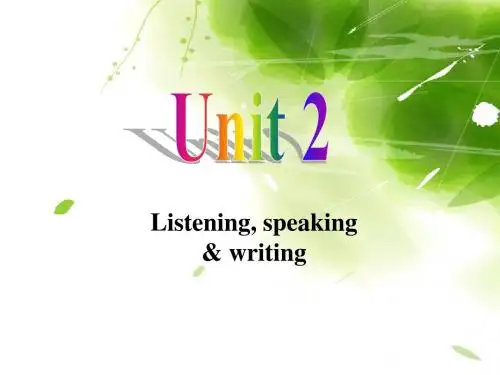
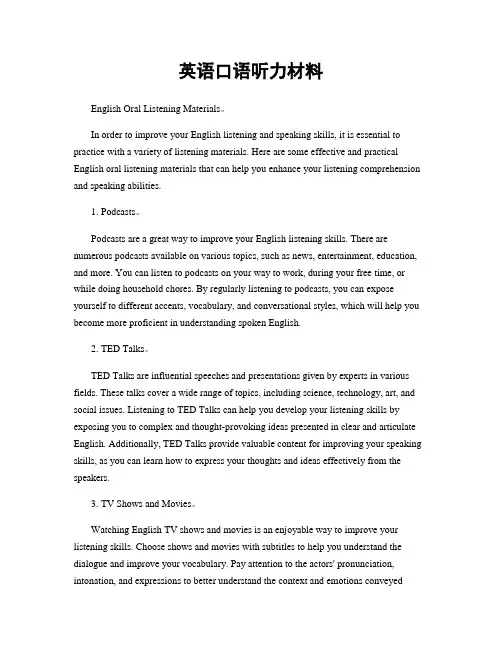
英语口语听力材料English Oral Listening Materials。
In order to improve your English listening and speaking skills, it is essential to practice with a variety of listening materials. Here are some effective and practical English oral listening materials that can help you enhance your listening comprehension and speaking abilities.1. Podcasts。
Podcasts are a great way to improve your English listening skills. There are numerous podcasts available on various topics, such as news, entertainment, education, and more. You can listen to podcasts on your way to work, during your free time, or while doing household chores. By regularly listening to podcasts, you can expose yourself to different accents, vocabulary, and conversational styles, which will help you become more proficient in understanding spoken English.2. TED Talks。
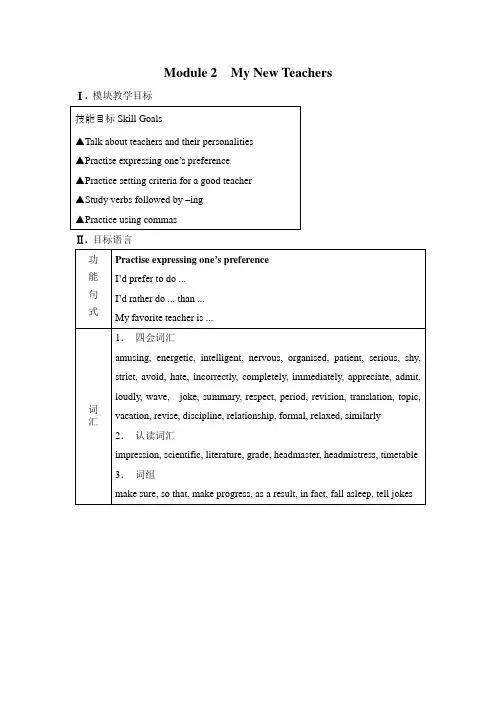
Module 2 My New Teachers Ⅰ. 模块教学目标Ⅱ. 目标语言Ⅲ. 教材分析和教材重组1. 教材分析本模块以My new teachers为话题, 介绍了几位具有不同教学风格和个性特征的教师,旨在通过模块的教学使学生学会描述教师及校园生活,并能运用所学词汇、句型来表达自己的喜好,同时通过学习制定好教师的标准使师生之间相互了解。
1.1 INTRODUCTION 首先介绍描述人物个性特征的形容词,再通过听说训练使学生在运用中熟练掌握这些形容词。
1.2 READING AND VOCABULARY 中的课文分为三部分,从学生的角度对三位不同年龄,不同风格的教师作了介绍。
从文中读者可了解三位教师的性格特征、授课方式及学生的评价。
文后设置了完成句子、写词、问答及讨论等阅读理解题,检测学生对课文的理解,培养学生获取信息、猜测词义等能力。
1.3 GRAMMAR 讲解了本模块的语法项目v?鄄ing形式。
1.4 SPEAKING 是课文内容及本模块话题的延续,要求学生通过口头练习运用所学语法知识描述自己喜爱的教师、科目及喜欢的原因。
1.5 LISTENING AND VOCABULARY分为六部分来进行。
Activities 1, 2 && 3分别以问答和听力练习的形式让学生就有关校园生活的词汇进行练习。
Activity 4要求学生表述自己对英语学习的看法并阐述原因,既巩固了所学生词,又运用了本模块的语法V?鄄ing 形式。
Activity 5 给出八组有联系的词,要求学生解释它们之间的联系。
Activity 6 回归课文,复习旧词汇,并表述对Mr Stanton的看法。
1.6 PRONUNCIATION 以听读的方式学习单词重音,为听力的提高奠定基础。
1.7 FUNCTION AND SPEAKING 列举了表达喜好的句式,要求学生以问答方式就自己所学科目进行对话练习。
1.8 EVERYDAY ENGLISH通过补全对话的形式学习一些日常用语。
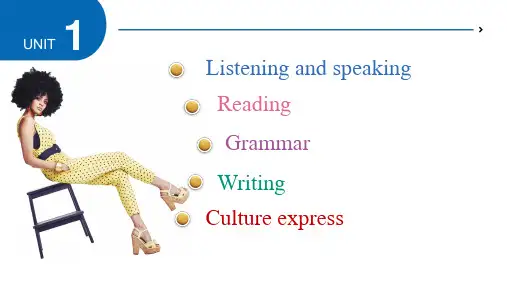


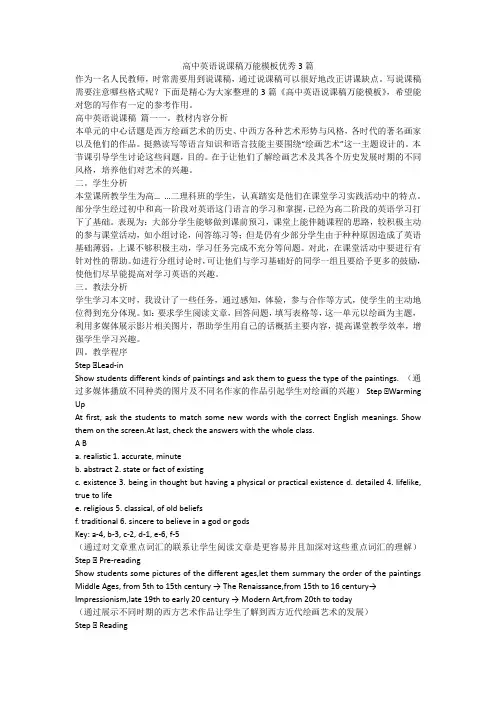
高中英语说课稿万能模板优秀3篇作为一名人民教师,时常需要用到说课稿,通过说课稿可以很好地改正讲课缺点。
写说课稿需要注意哪些格式呢?下面是精心为大家整理的3篇《高中英语说课稿万能模板》,希望能对您的写作有一定的参考作用。
高中英语说课稿篇一一。
教材内容分析本单元的中心话题是西方绘画艺术的历史、中西方各种艺术形势与风格,各时代的著名画家以及他们的作品。
挺熟读写等语言知识和语言技能主要围绕“绘画艺术”这一主题设计的。
本节课引导学生讨论这些问题,目的。
在于让他们了解绘画艺术及其各个历史发展时期的不同风格,培养他们对艺术的兴趣。
二。
学生分析本堂课所教学生为高… …二理科班的学生,认真踏实是他们在课堂学习实践活动中的特点。
部分学生经过初中和高一阶段对英语这门语言的学习和掌握,已经为高二阶段的英语学习打下了基础。
表现为:大部分学生能够做到课前预习,课堂上能伴随课程的思路,较积极主动的参与课堂活动,如小组讨论,问答练习等;但是仍有少部分学生由于种种原因造成了英语基础薄弱,上课不够积极主动,学习任务完成不充分等问题。
对此,在课堂活动中要进行有针对性的帮助。
如进行分组讨论时,可让他们与学习基础好的同学一组且要给予更多的鼓励,使他们尽早能提高对学习英语的兴趣。
三。
教法分析学生学习本文时,我设计了一些任务,通过感知,体验,参与合作等方式,使学生的主动地位得到充分体现。
如:要求学生阅读文章,回答问题,填写表格等,这一单元以绘画为主题,利用多媒体展示影片相关图片,帮助学生用自己的话概括主要内容,提高课堂教学效率,增强学生学习兴趣。
四。
教学程序Step ⅠLead-inShow students different kinds of paintings and ask them to guess the type of the paintings. (通过多媒体播放不同种类的图片及不同名作家的作品引起学生对绘画的兴趣)Step ⅠWarming UpAt first, ask the students to match some new words with the correct English meanings. Show them on the screen.At last, check the answers with the whole class.A Ba. realistic 1. accurate, minuteb. abstract 2. state or fact of existingc. existence 3. being in thought but having a physical or practical existenced. detailed 4. lifelike, true to lifee. religious 5. classical, of old beliefsf. traditional 6. sincere to believe in a god or godsKey: a-4, b-3, c-2, d-1, e-6, f-5(通过对文章重点词汇的联系让学生阅读文章是更容易并且加深对这些重点词汇的理解)Step Ⅰ Pre-readingShow students some pictures of the different ages,let them summary the order of the paintings Middle Ages, from 5th to 15th century → The Renaissance,from 15th to 16 century→Impressionism,late 19th to early 20 century → Modern Art,from 20th to today(通过展示不同时期的西方艺术作品让学生了解到西方近代绘画艺术的发展)Step Ⅰ ReadingTask 1 ScanningShow some questions on the screen.1、What were the artists interested in from 5th to 15th century AD?2、How did Masaccio paint his paintings?3、Why did the impressionists have to paint quickly?(通过让学生快速阅读回答问题提高学生阅读能力)Task 2 SkimmingLet the students read the passage again and get the main idea of it. Then plete the following chart on their own. And check the answers with the whole class.Show the chart with blanks on the screen. A few minutes later, check the answers.(通过再次阅读让学生把握文章的细节,更深层了解文章内容)Step Ⅰ ComprehendingLet the students read the passage again and tell whether the statements True or False according to the text.1、Western art has changed very little over the last seventeen centuries. F2、Painters in the Middle Ages did not use perspective. T3、Impressionists painted landscapes. T4、You cannot recognize any object in abstract modern art. F5、In the Renaissance most artists painted indoors. T(最后让学生通过对以上句子的正误判断对文章更准确的把握)五。
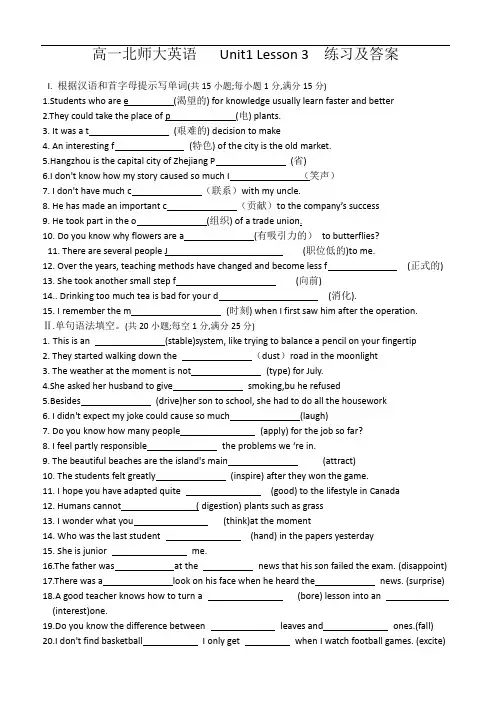
高一北师大英语Unit1 Lesson 3 练习及答案I. 根据汉语和首字母提示写单词(共15小题;每小题1分,满分15分)1.Students who are e (渴望的) for knowledge usually learn faster and better2.They could take the place of p (电) plants.3. It was a t (艰难的) decision to make4. An interesting f (特色) of the city is the old market.5.Hangzhou is the capital city of Zhejiang P (省)6.I don't know how my story caused so much I (笑声)7. I don't have much c (联系)with my uncle.8. He has made an important c (贡献)to the company’s success9. He took part in the o (组织) of a trade union.10. Do you know why flowers are a (有吸引力的)to butterflies?11. There are several people J (职位低的)to me.12. Over the years, teaching methods have changed and become less f (正式的)13. She took another small step f (向前)14.. Drinking too much tea is bad for your d (消化).15. I remember the m (时刻) when I first saw him after the operation.Ⅱ.单句语法填空。

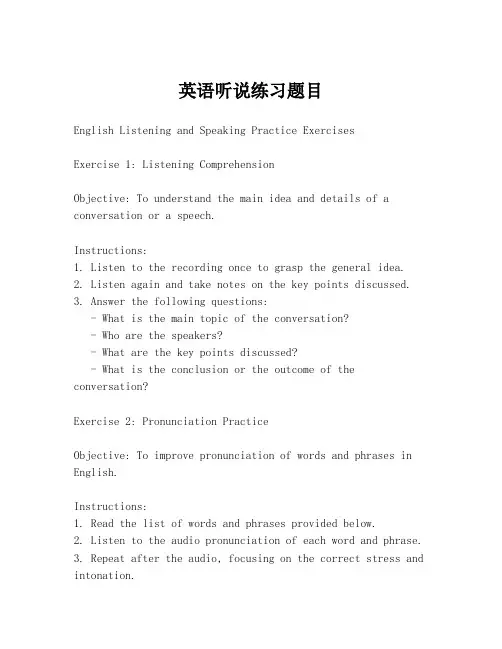
英语听说练习题目English Listening and Speaking Practice ExercisesExercise 1: Listening ComprehensionObjective: To understand the main idea and details of a conversation or a speech.Instructions:1. Listen to the recording once to grasp the general idea.2. Listen again and take notes on the key points discussed.3. Answer the following questions:- What is the main topic of the conversation?- Who are the speakers?- What are the key points discussed?- What is the conclusion or the outcome of the conversation?Exercise 2: Pronunciation PracticeObjective: To improve pronunciation of words and phrases in English.Instructions:1. Read the list of words and phrases provided below.2. Listen to the audio pronunciation of each word and phrase.3. Repeat after the audio, focusing on the correct stress and intonation.4. Record your own pronunciation and compare it with the audio.Word List:- Environment- Opportunity- Pronunciation- International- ConversationPhrase List:- How are you doing?- I couldn't agree more.- That's a great idea!- Let's get started.- What's the weather like today?Exercise 3: Role-Play ScenarioObjective: To practice conversational English in a specific context.Scenario: You are at a restaurant, ordering food with a friend.Instructions:1. Prepare by reading through the menu.2. Take turns playing the roles of the customer and the waiter.3. Use polite expressions and ask for recommendations.4. Practice using vocabulary related to food and dining.Sample Dialogue:- Customer: Good evening, could you recommend a dish?- Waiter: Sure, our signature dish is the grilled salmon with a side of vegetables.- Customer: That sounds delicious. I'll have that, please.Exercise 4: Debate PracticeObjective: To develop the ability to express and defend opinions in English.Instructions:1. Choose a topic for debate, such as "The impact of social media on society."2. Divide into two teams, with one supporting the positive aspects and the other the negative aspects.3. Each team member should prepare arguments and counterarguments.4. Conduct the debate, ensuring each side gets an equal opportunity to speak.Exercise 5: StorytellingObjective: To enhance narrative skills and creativity in English.Instructions:1. Choose a theme for your story, such as "A day in the life of a superhero."2. Write a brief outline of the story, including thebeginning, middle, and end.3. Practice telling the story out loud, using descriptive language and varied intonation.4. Record your storytelling and listen to it to identify areas for improvement.Exercise 6: Interview SimulationObjective: To practice English in a formal interview setting.Instructions:1. Prepare a list of potential interview questions, such as "Tell me about yourself."2. Role-play an interview, with one person being the interviewer and the other the interviewee.3. Use appropriate language and maintain eye contact.4. After the interview, provide feedback on language use and body language.Exercise 7: News ReportObjective: To understand and retell news stories in English.Instructions:1. Listen to a news report from a reliable source.2. Take notes on the key points of the story.3. Summarize the news report in your own words.4. Discuss the implications or reactions to the news story with a partner.Remember, practice makes perfect. Regularly engage in theseexercises to improve your English listening and speaking skills.。
Module 2 No drugs一、教材分析本课时所教的是外研版高一上学期使用的必修⑵Module2中的Listening and vocabulary 和speaking部分的内容,是本模块的第三课时。
要求通过听的活动了解和学习有关吸毒和犯罪的词汇,培养表达结果,作总结逻辑思维能力和获取信息的能力。
Speaking讨论抽烟带来的危害,为了与听力部分的内容衔接,我对Speaking中的话题作个修改,把讨论吸烟的危害改编成毒品的危害。
在这节听说课之前,学生学习了Reading and vocabulary,通过阅读文章,已经掌握了部分抽烟、吸毒及其危害的词汇,本课时由复习旧课入手,引入新课的新词汇,并以听说为主线,对吸毒这一主题进行延伸和拓展。
二、教学目标本模块是通过学习表达吸毒及其危害的词语和其它语言形式,养成良好生活习惯,教育学生关爱社会,关爱他人,远离毒品。
三、语言知识目标:1、词汇有:burglary, connection, crime, criminal, illegal, ratio, shoplifting, treatment2、语言技能目标:听懂有关吸毒及其危害的话语并获取信息,学会抓住关键意见,进行summarizing,并用英语讨论,表达吸毒的危害。
3、情感目标:提高自我保护意识,养成良好生活习惯,珍爱生命,远离毒品。
4、学习策略方面:通过组织学生预测问题、听辩问题,培养抓住和辨别信息要点的能力。
通过拓展讨论问题,培养学生独立思考,自主学习的能力。
以individual work, pair work, group work等形式加强合作学习,从网上或其它媒体了解吸毒危害,学会分析、归纳。
文化意识方面:通过听、说,还有一些补充材料加强学生为毒品危害的认识,提高自我保护意识。
Period 1 Introduction; Speaking; Writing一.确定目标1.学习与吸烟相关的单词2.了解吸烟的危害3.坚定禁止吸烟的态度,维护公共健康二.基础自学1.翻译bronchitis ________ cancer ________ cigarette ________heart disease _____ injured ________ tobacco________在20世纪90年代 ________ 由于________prematurely ________2.Do the following exercises.(1)._________ means the end of life.(2).When someone stops living, he ______.(3).People smoke things like _________ and _________.(4).Smoking can cause illnesses like _________, ________ and __________.(5).When you get hurt, you are _________.三.情景解疑Explain some language points1.During the 1990s, 21 million people died as a result of smoking cigarettes. as a result of\ because of + n. pron. v-ing 因为,由于由于粗心驾驶的结果,他最后被送进了医院.He ended up in hospital as a result of his careless driving.as a result 表示结果; as a result of 表示前面的原因.There was a terrible accident, _________ , I was late for school.Many people died ___________ smoking.2. Thirteen people die every hour from illnesses related to smoking tobacco, suchas cancer, bronchitis and heart disease.die of (内因) cold, hunger, sadness, cancer, old age, thirstdie from(外因) wound, lack of food, accident, smokingrelate vt. 联系relate A to \ with B 将……联系起来be related to = be connected with 与……有联系The matter _____ your career can not be taken for granted.A. relates toB. related toC. connectsD. connected四.合作探究小组活动,讨论人们吸烟的原因及其造成的危害。
英语听力中级口语练习### English Listening and Speaking Practice for Intermediate LearnersIntroductionWelcome to the world of English language learning! If you'reat an intermediate level, you've likely mastered the basics and are now looking to improve your listening and speaking skills. This guide is designed to help you navigate throughthe complexities of the English language, with a focus on enhancing your comprehension and conversational abilities.1. Listening ComprehensionTo become a proficient listener, you must first understandthe different accents and dialects in English. The British, American, Australian, and Canadian accents, for example, can vary significantly and may initially be challenging to follow.- Watch English Movies and TV Shows: Start by watching movies and TV series with English subtitles. Gradually, try tofollow the dialogue without the subtitles.- Listen to English Podcasts: Podcasts on various topics canbe a great way to familiarize yourself with the natural flowof conversational English.- Use Language Learning Apps: Apps such as Duolingo, Rosetta Stone, or Babbel offer listening exercises that can betailored to your skill level.2. Vocabulary ExpansionVocabulary is the cornerstone of effective communication. To improve your speaking skills, you need to expand your vocabulary.- Read Widely: Books, newspapers, and magazines can introduce you to new words and phrases.- Keep a Vocabulary Journal: Write down new words you encounter and practice using them in sentences.- Engage in Conversations: The more you speak, the more opportunities you have to learn and use new vocabulary.3. Pronunciation PracticeClear pronunciation is key to being understood in English. Focus on the sounds that are most difficult for you.- Use a Mirror: Practice speaking and observe your mouth movements to ensure correct pronunciation.- Record Yourself: Listening to recordings of your speech can help you identify areas for improvement.- Work with a Native Speaker: Native speakers can provide valuable feedback on your pronunciation.4. Conversational SkillsBeing able to hold a conversation is an essential part of speaking English.- Join Language Exchange Groups: These groups can provide a platform to practice speaking with others who are also learning English.- Practice with a Language Partner: Regular practice with a partner can help you become more comfortable in conversation. - Participate in Discussions: Engage in discussions on topics that interest you to practice your speaking skills in a more formal context.5. Cultural UnderstandingUnderstanding the cultural context of the language cangreatly enhance your listening and speaking abilities.- Learn About English-speaking Countries: Understanding the culture can help you grasp the nuances of the language.- Celebrate Holidays and Traditions: Participating incultural events can provide insight into the language's usein different social situations.ConclusionImproving your English listening and speaking skills is a journey that requires patience and practice. By immersing yourself in the language, engaging with native speakers, and continually expanding your vocabulary, you'll find yourself becoming more confident and fluent in English. Remember, the key to success is consistent practice and a willingness to learn from your mistakes. Happy learning!。
英语听口常考单词Listening and speaking are integral to mastering English, and vocabulary is the cornerstone of both skills. Here are some essential words that are often tested in English listening and speaking exams:In the realm of everyday communication, words like "greeting," "introduce," and "conversation" are pivotal. They set the tone for any interaction, whether it's a casual chat or a formal meeting.Adjectives are crucial for adding color to our speech. Terms such as "amazing," "boring," and "fascinating" help express our emotions and opinions vividly.Nouns that describe places, like "cinema," "museum," and "restaurant," are frequently used to talk about activities and locations, making them a staple in English exams.Verbs are the action words that drive our sentences. "Travel," "enjoy," and "achieve" are examples of verbs that are often tested, as they reflect a wide range of human experiences.Prepositions are small but mighty words that indicate relationships between other words in a sentence. "In," "on," and "at" are common prepositions that are essential for clear and accurate communication.Phrasal verbs, such as "look up," "put off," and "come across," are combinations of a verb and a preposition or adverb that create new meanings, and they are a common feature in English language assessments.Finally, idiomatic expressions like "break a leg," "bite the bullet," and "hit the sack" add a layer of cultural understanding to the language. They are often included in exams to test a learner's familiarity with English idiom.By focusing on these categories of words, students can enhance their listening and speaking abilities, ensuring they are well-prepared for the challenges of English language exams.。
Period 4 Listening and Vocabulary,PronunciationTeaching Goals:1.To help Ss learn how to listen to some information about the Beatles.2.To let Ss learn how to express their feelings about music.3.To help Ss learn how to talk about some Chinese and foreign musicians.Teaching Procedures:Step 1.Pre-listeningPurpose:To help Ss get some general information about the Beatles.1.Group workAsk Ss to discuss the questions in Activity 1 on P26 before listening.(图2—3—9)Suggested Answers:Various answers are acceptable.2.Pair workIntroduce something about the Beatles and then have Ss study some new words.Then ask them to finish Activity 2 on P26.Suggested Answers:(1)They remember it. (2)The words. (3)Difficult.(4)More than one. (5)They like them. (6)No,they don’t.Step 2.While-ListeningPurpose:To develop Ss’listening ability.1.Individual workAsk Ss to listen the tap and decide if these sentences are true(T)or false(F).(1)Three of the Beatles played guitar.(2)The Beatles all e from different places in England.(3)Americans liked the Beatles when they toured for the first time.(4)After visiting India,the Beatles changed their instruments.(5)They sold more albums than any other rock band.2.Individual workAsk Ss to listen again and make notes about these songs and albums in Activity 4 on P26.(1)serious (2)ballad (3)plex (4)last album3.Individual workAsk Ss to listen to the tape again,and then fill in the blanks with the information that they hear.The Beatles were the most successful band in the history of popular music.The band ______John Lennon,Paul McCartney,George Harrison and Ringo Starr.Start played ______ ,the other three played______.Lennon and MeCartney wrote most of the songs.All the Beatles were born in_________ in the north of England.During_____,the Beatles were _______ by American rock singers,such as Chuck Berry and Elvis Presley.They had their______ in 1962 with a _____called Love Me Do(1962).In 1964,after they had bee stars in their own country,the Beatles toured the United States and were a huge_______.During the_____,the Beatles were one of the bands which gave rock music _____ .Some of their songs were quite serious,such as _____;there were _____such as________ and more_________ such as Strawberry Fields Forever.By the late 1960s,their music had changed pletely.They had stopped writing simple songs with catchy tunes.The _____and the____ had bee mole interesting and they had begun to use________,too.For example,after_____,they started using Indian instruments.Some of their _____changed pop music pletely.Their last album was _____in 1970. After they had finished______.Let:It Be,they _____.By the time they stopped working together,they had sold more albums______ in history.After the group had_____,all the Beatles performed as_____ or started other bands.John Lennon died in New York in 1980.George Harrison died in 2001.Suggested Answers:(1)consisted of(2)drums(3)guitar(4)Liverpool(5)the early 1960s(6)influenced (7)first hit(8)catchy song(9)success(10)mid一1960s(11)a new direction(12)Nowhere Man(13)ballads(14)Yesterday(15)plex songs(16)tunes(17)lyrics(18)new instruments(19)visiting India(20)albums(21)Let h Be(22)recording(23)split up(24)than any other band(25)broken up(26)solo artistsStep 3.Post-listeningPurpose:To let Ss learn how to express their feelings about music.Ask Ss to discuss the content of the listening material in pairs.Suppose student A is crazy about the Beatles,while student B knows little about them.B wants to know more about the Beatles.At first.A is surprised that B knows little about the Beatles.Then A tells B about the Beatles proudly and happily. For your reference:A:Haven’t you…?/My God!/Oh no!B:Sorry,but could you tell me…?A:Of course./All right.…B:Really?/Cool!/Excellent!/Wonderful!Step 4.PronunciationAsk Ss to use the right intonation to speak the answers to Grammar 2 Activity 4 on P27.Then listen to the tape and check it.Suggested Answers:(1)Unfortunately↗,he arrived at the show↗after I had left.↘(2)By the time we arrived at the stadium↗,the band had begun playing.↘(3)Fortunately↗,the power cut happened↘ after the fans had left the stadium.↘(4)Before he made latest album↗,he had recorded some songs with Paul McCartney.↘Step 5.HomeworkFinish the Listening and Speaking exercises in the Workbook on P83.。